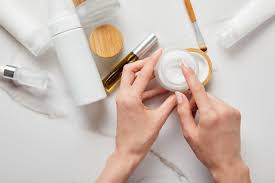
.webp)
.webp)
.webp)
Fatty Alcohols in Skin Care: Understanding Their Role, Benefits, and Uses
.webp)
.webp)
Fatty alcohols are essential ingredients in many skin care products. Despite their name, these ingredients are very different from simple alcohols and are not harmful or drying to the skin.
.webp)
.webp)
.webp)
In fact, fatty alcohols improve the feel, texture, and performance of creams, lotions, and cleansers. They are especially useful in formulations made for dry or sensitive skin.
.webp)
.webp)
In this article, we’ll explore what fatty alcohols are, how they benefit your skin, and why they are commonly used—even in “alcohol-free” products.
.webp)
.webp)
.webp)
What Are Fatty Alcohols?
.webp)
.webp)
Fatty alcohols, also called long-chain alcohols, are a class of ingredients made from long hydrocarbon chains with an -OH (alcohol) group.
.webp)
.webp)
.webp)
Unlike drying alcohols (like ethanol), fatty alcohols are non-drying, non-irritating, and very skin-friendly.
.webp)
.webp)
They are typically derived from plant oils, animal fats, or produced synthetically.
.webp)
.webp)
.webp)
Fatty Alcohols vs. Simple Alcohols
.webp)
.webp)
It’s important to understand the difference between fatty alcohols and short-chain alcohols:
.webp)
.webp)
.webp)
Type of Alcohol Examples Effect on Skin Common Use
.webp)
.webp)
Simple Alcohols Ethanol, Isopropyl Drying, irritating Astringents
.webp)
.webp)
.webp)
Fatty Alcohols Cetyl, Stearyl, Cetearyl Moisturizing, soothing Emollients, emulsifiers
.webp)
.webp)
Fatty alcohols are safe for all skin types and are often used in products labeled “alcohol-free” because they don’t cause the same side effects as simple alcohols.
.webp)
.webp)
.webp)
Why Are Fatty Alcohols Used in Skincare?
.webp)
.webp)
Fatty alcohols serve multiple roles in skin care products:
.webp)
.webp)
.webp)
Improve product texture
.webp)
.webp)
Enhance moisturizing properties
.webp)
.webp)
.webp)
Stabilize oil-and-water mixtures
.webp)
.webp)
Thicken lotions and creams
.webp)
.webp)
.webp)
Help ingredients blend smoothly
.webp)
.webp)
They are versatile multifunctional ingredients that make skin care products feel better and perform more consistently.
.webp)
.webp)
.webp)
How Fatty Alcohols Work in Skincare Products
.webp)
.webp)
1. Fatty Alcohols as Emollients
.webp)
.webp)
.webp)
Fatty alcohols act as emollients, softening and smoothing the skin.
.webp)
.webp)
They fill the gaps between skin cells, forming a moisture-retaining layer that improves hydration. This layer is lightweight and non-greasy.
.webp)
.webp)
.webp)
Fatty alcohols help reduce flakiness and rough texture, making them perfect for dry, sensitive, or mature skin.
.webp)
.webp)
2. Fatty Alcohols as Surfactants
.webp)
.webp)
.webp)
Surfactants help mix oil and water—two ingredients that normally separate.
.webp)
.webp)
Fatty alcohols lower the surface tension between water and oil, creating a homogeneous and stable formula.
.webp)
.webp)
.webp)
They are often used in cleansers and creams to help blend hydrating and nourishing ingredients smoothly into your skin.
.webp)
.webp)
3. Fatty Alcohols as Emulsifiers
.webp)
.webp)
.webp)
Emulsifiers keep oil and water mixed over time. Without them, your lotion would separate into layers.
.webp)
.webp)
Fatty alcohols form a stable emulsion, improving product uniformity, feel, and shelf life.
.webp)
.webp)
.webp)
They also help distribute active ingredients evenly so your skin gets consistent results with each use.
.webp)
.webp)
4. Fatty Alcohols as Thickeners
.webp)
.webp)
Fatty alcohols increase a product’s viscosity, giving it a thicker, richer texture.
Their long chains tangle with other ingredients to create a dense, luxurious feel.
Thicker products often feel more moisturizing and are preferred in night creams, balms, and body butters.
Types of Fatty Alcohols in Skin Care
There are several types of fatty alcohols used in skincare. Each type has a slightly different structure and function.
Here are the most common fatty alcohols and what they do:
1. Cetearyl Alcohol
A mix of cetyl and stearyl alcohol
Derived from coconut or palm oil
Works as an emollient, emulsifier, and thickener
Common in creams, lotions, and moisturizers
Cetearyl alcohol improves texture and helps creams spread evenly.
2. Cetyl Alcohol
Derived from coconut oil or palm oil
Functions as a thickener and emollient
Adds a creamy feel to lotions and cleansers
Helps lock in moisture
Despite its name, cetyl alcohol is gentle and non-drying.
3. Stearyl Alcohol
A long-chain alcohol used as an emulsifier and stabilizer
Often found in moisturizing creams and hair care
Helps improve texture and consistency
It can also enhance the moisturizing power of other ingredients.
4. Behenyl Alcohol
Derived from vegetable oils
Has a high melting point, great for solid balms and creams
Acts as an emollient, thickener, and stabilizer
Leaves a silky, smooth finish
Behenyl alcohol is often used in clean beauty products for its safety and performance.
5. Myristyl Alcohol
Derived from coconut or palm kernel oil
Used to smooth and soften textures
Less common but effective as a texture enhancer
It helps lotions feel more even and spreadable.
Are Fatty Alcohols Safe for Skin?
Yes. Fatty alcohols are non-irritating, non-drying, and generally well-tolerated by all skin types.
They are considered safe by dermatologists and regulatory agencies, including:
U.S. FDA, EWG (Environmental Working Group), EU Cosmetics Regulation
In fact, many products designed for sensitive or eczema-prone skin include fatty alcohols for their soothing effects.
Can Fatty Alcohols Cause Breakouts?
Fatty alcohols are generally non-comedogenic, meaning they don’t clog pores.
However, everyone’s skin is different. Some individuals with very acne-prone skin may be sensitive to certain fatty alcohols like myristyl alcohol.
If you’re unsure, choose products labeled “non-comedogenic” or patch-test new products before full use.
Are Fatty Alcohols Vegan and Clean?
Fatty alcohols can be either plant-based or animal-derived.
Most commercial skincare products today use plant-derived fatty alcohols, making them suitable for:
Vegan skincare, Clean beauty formulations, Eco-conscious consumers
To be sure, look for labels like:
“Vegan”, “Plant-derived ingredients”, “No animal by-products”
Fatty Alcohols in “Alcohol-Free” Products
Yes—fatty alcohols can still be in “alcohol-free” products.
The term “alcohol-free” typically refers to simple alcohols like ethanol, which can dry or irritate the skin.
Fatty alcohols do not cause dryness, so they are allowed in products marketed as alcohol-free.
They’re often included in sensitive skin products for their hydrating benefits.
Summary: Benefits of Fatty Alcohols in Skin Care
Function Benefit to Skin
Emollient Softens and smooths dry, flaky skin
Emulsifier Keeps water and oil mixed for product stability
Thickener Adds luxurious texture to creams and lotions
Surfactant Improves blend and performance of active ingredients
Conclusion
Despite their name, fatty alcohols are gentle, moisturizing, and beneficial to your skin.
They improve product texture, increase hydration, and help your skincare routine feel more luxurious and effective.
If you have dry, sensitive, or mature skin—or just want smoother-feeling products—fatty alcohols are a great addition to your routine.
Now that you know what they are, you’ll be better equipped to read labels and make smart, skin-friendly choices.



